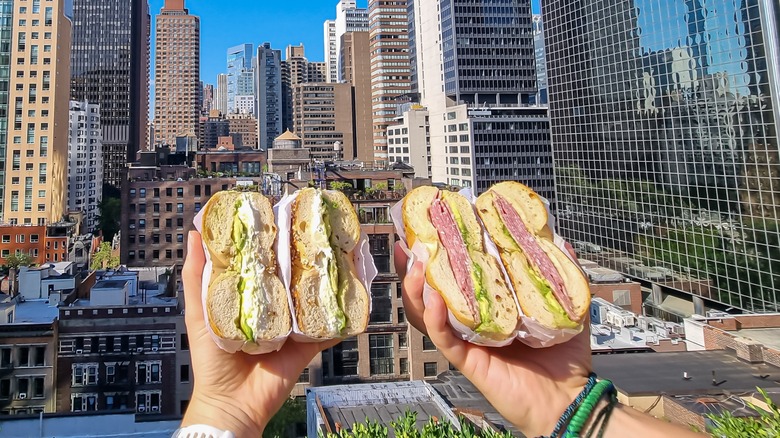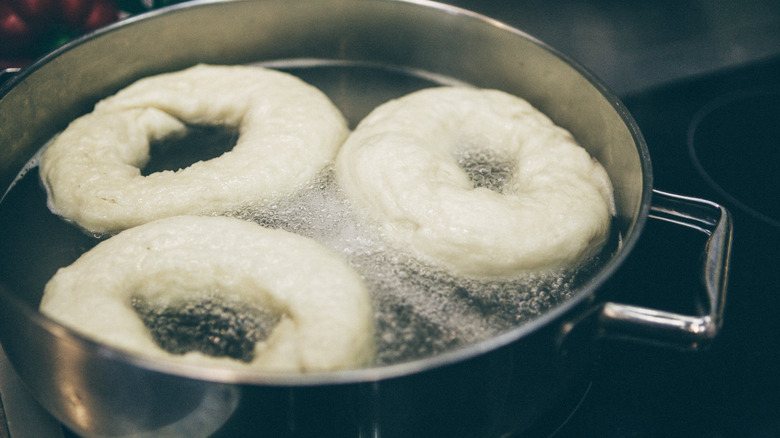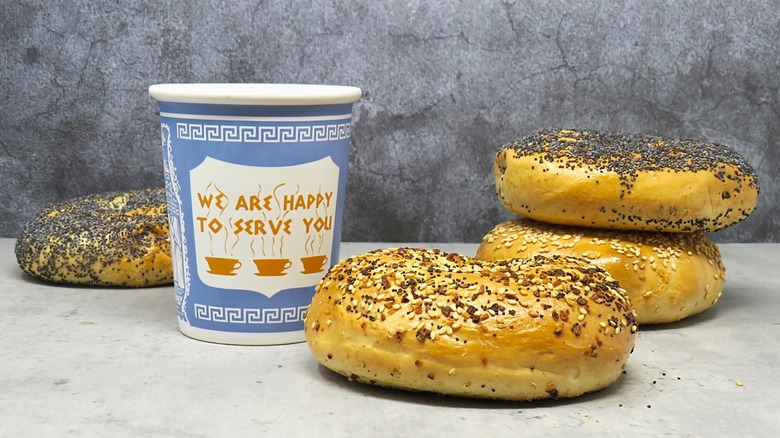Does NYC's Tap Water Actually Make Its Bagels Better?
New York City is famous for a lot of things, including a number of foods that people swear are the best in the world. New York-style pizza, pastrami sandwiches, cheesecake, and hot dogs from street vendors are some examples, but the one food that rules them all in the Big Apple just might be the humble bagel. Tourists from all over the world agree that there is something about New York City bagels that makes them special. It's become widely believed that the secret to their superiority lies in the tap water that flows throughout the city that more than eight million people call home. The phenomenon is so well known that a company even developed a device to recreate New York tap water.
Could something as simple as the water make that much of a difference in bagels made in New York than ones made in Omaha, for example? Scientifically, yes, the tap water in the city that never sleeps is different, but it likely plays a much smaller role in making a great bagel than what many believe. Overall, the water helps the bagels achieve a wonderful flavor and texture, but the cooking technique is a much more important part of creating the best bagels in the world.
There's something in the water
The water supply in New York City comes mostly from the Hudson Valley area and the Catskill Mountains and is considered to be some of the finest drinking water in the nation. With low amounts of calcium and magnesium, the water is considered soft, and soft water doesn't develop the gluten in flour as much as hard water. The resulting dough tends to be softer and stickier than dough made with hard water, creating a more tender crumb in the finished bagels. Soft water can also be described as having a saltier flavor when compared to hard water because it contains more sodium.
Although the water is a factor in making great bagels, iconic New York bagels have less to do with the water and more to do with what happens before the dough is placed in the oven to bake. Traditional bagel makers proof their shaped dough for up to two days in a cool environment. During this time, the yeast ferments, releasing all kinds of delicious flavors. Equally important is flash-boiling the unbaked bagels in kettles of boiling water. This step results in a shiny appearance and deliciously chewy texture once they're baked. In this sense, the water is, in fact, a key to achieving perfect bagels — just not the way many people believe. Many bagel producers will simply steam their bagel dough before baking it, but any self-respecting bagel maker in New York would never substitute steam for a quick dunk in boiling water.
Authenticity and tradition are important to New Yorkers
In a world of cheddar jalapeño, rainbow, and cinnamon raisin bagels, many purists will tell you there are very few acceptable toppings and flavors that belong on a bagel: plain, everything, poppyseed, egg, pumpernickel, onion, sesame, and garlic. With that said, this is New York, after all, and if you want a cinnamon raisin or french toast-flavored bagel, you can find it somewhere.
What may come as a surprise to many is that New York bagels are not traditionally toasted before they are eaten. This is because they are ideally supposed to be sold and eaten warm, eliminating the need for time in the toaster. On your warm bagel, a schmear of cream cheese (and optionally lox) is the traditional accompaniment. Clearly, plenty of New Yorkers also like variety, though; just take a look at the Brooklyn Bagel & Coffee Company, which makes bagels the traditional way, but also prides itself on eccentric cream cheese options. As always, a bagel always tastes better with a hot cup of coffee ... made with New York City tap water, that is.


